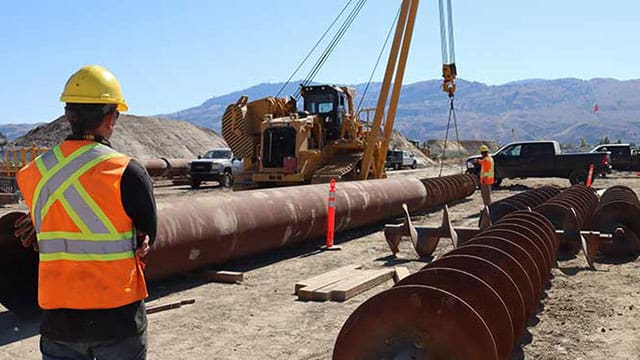He saved the Trans Mountain pipeline project
 It was so improbable that, at first, I thought it was just a silly dream. But, no, there it is on the internet (and therefore must be true). Alberta Premier Danielle Smith did, in fact, say the prime minister did something right.
It was so improbable that, at first, I thought it was just a silly dream. But, no, there it is on the internet (and therefore must be true). Alberta Premier Danielle Smith did, in fact, say the prime minister did something right.
Justin Trudeau saved the faltering Trans Mountain project when no private sector operator wanted to keep it alive. And Alberta, so eager to attack the prime minister these days, owed him a huge debt of gratitude. (To be clear, she didn’t say that part.)
It’s been six years since Trudeau and then Finance Minister Bill Morneau convinced the Liberal cabinet to buy Trans Mountain. The project, key to Alberta’s export ambitions, seemed doomed when private developer Houston-based Kinder Morgan Inc. signalled that it planned to pull out over frustrations with British Columbia’s NDP government. The purchase saved the controversial project from drowning under a flurry of logistical, regulatory and social barriers.
And it ensured a great deal more Alberta oil could be sent aboard.
 Photo courtesy Trans Mountain |
| Related Stories |
| Killing Trans Mountain project would devastate Indigenous communities |
| Why Trans Mountain Pipeline expansion still makes sense
|
| The Trans Mountain truth defies activists’ claims
|
“I’m pleased that they stepped in to de-risk and finish the project,” said Smith. Not to be seen as too gracious, she added that Ottawa ideally would have also supported the now-dead Energy East and Northern Gateway projects. Fat chance, given Eastern Canada’s opposition to those pipelines.
The expansion project twins the old 1,150-km Trans Mountain pipeline between Alberta and British Columbia, nearly tripling the system’s export facilities. From 300,000 barrels per day, the twinned pipeline can deliver up to 890,000 barrels per day.
Environmentalists were infuriated and baffled by Trudeau’s move to save Trans Mountain. The old pipeline, built in 1953, has had a history that can be described as spotty, at best. Since 1961, 84 spills have been reported. Nearly one-third of those occurred along the pipeline, and 20 incidents were linked to the release of crude oil from the pipeline. Not a happy environmental story.
The expansion also seemed to be at odds with Trudeau’s ongoing campaign to dramatically curb Canada’s carbon emissions. But, in a show of principle that may surprise some, he had a promise to keep: When he launched his bid for Liberal leadership in 2012, he vowed to back Alberta’s energy sector. The approval of Trans Mountain in 2016 affirmed his commitment.
The irony is delicious. The current Alberta government, it appears, wants the feds to stay out of its business – until they need their help. Those Trudeau-hating oil patch workers might want to pause and consider that – like it or not – some of them owe their jobs to the huge financial risk the federal Liberals took on this pipeline.
More than a risk. The enormously costly Trans Mountain project will almost certainly be a money-loser for the taxpayer-backed federal government. When it bought the pipeline in 2018 for $4.5 billion, it was estimated the entire project would cost $7.4 billion. The final tab is not yet known, but the latest estimate is in the neighbourhood of $34 billion. “Staggering” hardly seems to be an adequate description for the number.
Watchers might rightly wonder how the final tally could reach a point that Tristan Goodman, chief executive of Explorers and Producers Association of Canada (EPAC), called “obscene.” Trans Mountain Corp. attributed the rise in price to inflationary pressures, floods and later wildfires in British Columbia, route changes to avoid environmentally sensitive areas, labour shortages and agreements with Indigenous communities. It also had to spend money on cultural protection for the 83,000 artifacts uncovered during construction.
Goodman said the federal government’s oversight, while needed, has failed to be “efficient and cost-effective.” With hurdles like these, Canadians may never see a megaproject like this again.
The upshot for Canadians is that when the feds sell the pipeline – as promised – it will almost certainly take a bath at our expense. And yet, even with the breathtaking cost, the project was worthwhile and arguably badly needed for the country’s economy.
In announcing the purchase, Morneau said the project is in the national interest and that proceeding with it will preserve jobs, reassure investors, and get resources for world markets. For Alberta, the real value – and one of the key reasons this project became so important – is that oil producers will at least in part be set free from the “take-it-or-leave-it” pricing for oil sands product.
Alberta’s oil, known as Western Canadian Select (WCS), is among the cheapest crude oils in the world, according to personal finance site WOWA. On average, WCS traded with a discount of US$17.2 relative to U.S. West Texas Intermediate (WTI). In November 2018, WCS discount relative to WTI reached a record of US$46/bbl.
This forced discount on Canadian oil is criminal and unjustifiable. Now, with the opportunity to export more of it to world markets, Alberta producers may finally see pricing fairness. That, in turn, will bolster government coffers with more revenue, easing the sting of the project’s cost and making the Trans Mountain gamble seem like not such a bad investment.
Yes, it is true that Canada and all the nations of the world need to do better at decarbonizing as climate change advances at an alarming pace. But the world will not be cutting off the oil taps tomorrow. If the world can’t buy oil from us, it will simply source it from countries like Russia, which will be happy to use oil revenue to arm itself in its war with Ukraine. And let’s not forget about the much more urgent need for countries like China and India to phase out the use of coal, where demand for the dirtiest fossil fuel of all continues to surge.
In the meantime, it is worth remembering that this project got done because two levels of government worked together as partners, rather than adversaries. Let’s not forget the feds bought Trans Mountain when the NDP’s Rachel Notley was premier. Will Alberta’s current premier get the message?
Sadly, not as long as Smith sees short-term political opportunity in picking fights. Let’s hope her petty preference for polarizing pugnacity doesn’t come back to bite all Albertans.
Doug Firby is an award-winning editorial writer with over four decades of experience working for newspapers, magazines and online publications in Ontario and western Canada. Previously, he served as Editorial Page Editor at the Calgary Herald.
For interview requests, click here.
The opinions expressed by our columnists and contributors are theirs alone and do not inherently or expressly reflect the views of our publication.
© Troy Media
Troy Media is an editorial content provider to media outlets and its own hosted community news outlets across Canada.

